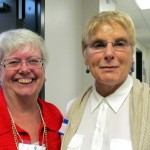- Carole Nagengast, speaker
- Dr. Lawrence Geraty guest
- Dr. Deborah Wong, new member
- Linda Dunn guest, Christine Gailey, member Carole Nagengast, speaker
- Barbara Ryon, AAUW Riverside President, Carole Nagengast
By Taffy Geith
Once again the Community Room of Habitat for Humanity, 2180 Iowa Ave., was the meeting place for the Riverside Branch of AAUW at 10:00 AM on Thursday, February 13.
President, Barb Ryon, had warm greetings for all members and guests. She noted the presence of a special guest, Dr. Larry Geraty, past president of La Sierra University and past president of the International Relations Council of Riverside.
Continuing on with a short business agenda, President Ryon, asked that we read the minutes from the last meeting but delay our approval until corrections could be made. Carlease Chandler, Membership VP, called attention to our yearly book donations to Moreno Valley Schools. Where previously our donations were to K-1 teachers, this year a Special Education School, Alesandro K -12, requested a long list of specific books. This changed not only the scope of our mission but the way that we implement it. Example: Should we donate books and/or money for books — or both? Carlease has asked that we take the time to discuss the different options from which we have to choose, and then make determinations at a later date. The book donations have become part of our mission.
Jo Turner, Publications Chair, introduced Carole Nagengast, Professor Emerita of Anthropology at University of New Mexico, author of numerous articles, and a member of Amnesty International for 32 years.
As a UCR graduate student in 1977, Ms. Nagengast, went on a group tour to the concentration camp at Auschwitz in Poland, and had her first confrontation with a concrete example of the total annihilation of human rights. While she knew a lot about the Holocaust, it was always in the abstract. The Nazis documented everyone who passed through the gates, so that here she saw the photographs as well as the real displays of baby shoes, human hair for mattresses, and other artifacts. She also heard stories of the sexual assaults that took place and the heroic acts of heroism that inmates performed to avoid extermination.
The contemporary idea of human rights is derived from the Philosopher, John Locke. The Western legal definition came about as a direct result of the German Holocaust. Eleanor Roosevelt was instrumental in 1948 in drafting the Universal Declaration of Human Rights. (Ms Nagengast gave each of us an abbreviated list.) This lists the civil, political, cultural, and economic rights which the International Community has tried to protect. We’ve made progress, but there’s more to be done.
Amnesty International began in England in 196l, but by the 1970’s became prominent in the US.
Amnesty International is run by ordinary people – their goals: promote human dignity; stop torturing; do away with the death penalty; promote fair trials; and alleviate conditions that lead to inhuman rights. Ms. Nagengast is an activist. Being an activist means: organizing people on behalf of others: writing letters to draw attention to a wrong-doing; finding persons who have disappeared (50,000 people have been found by Amnesty International). Recently, flash mobs were organized in Canada, concerts in Italy, and workshops in Morocco. Amnesty gives hope to people who are oppressed.
Returning to Poland in 1979 for 14 months, Ms. Nagengast saw the Solidarity movement come into being. This event convinced her to become involved in volunteering. A military coup occurred in 1981 in Turkey, Amnesty International needed someone to coordinate groups in Istanbul. She accompanied the Riverside Group, organizing protests, calling on Congressional Representatives, and asking Political-Science students at UCR to help. She continued working in Turkey, meeting relatives of prisoners, talking with the Ambassador to Turkey, and testifying before Congress. She cautions that this work is NOT romantic – lots of ambiguity is involved. One cannot be squeamish. Now and then one meets government officials who do bad stuff. For the last 15 years, Ms. Nagengast, has been on the Amnesty International Board of Directors, being its Chair for part of that time. This was all administrative work and she retired in 2013.
Ms. Nagengast believes that human rights are based on values that transcend politics and religion. Amnesty International has a reputation for being fair—the US is held to the same values as Cuba or Russia would be. She invited all present to be activists, to join Amnesty International, to donate money and to write letters protesting inhuman treatment. She provided each of us with two hand-outs that gave details of two people in Russia – both held in Russia’s crackdown on free speech. These hand-outs included a sample protest letter — to encourage our participation.
Members of our Branch were inspired and enlightened by Ms. Nagengast’s experiences as an activist and by her clear definition of the roles that Amnesty International had played in the work for Human Rights around the world. We are aware that we can expand our activism. She quoted Eleanor Roosevelt, “Human Rights come from areas close to home.”






With having so much written content do you ever run into any problems of plagiarism or copyright violation? My blog has a lot of exclusive content I’ve either authored myself or outsourced but it seems a lot of it is popping it up all over the web without my agreement. Do you know any methods to help stop content from being ripped off? I’d definitely appreciate it.
So far, I haven’t had much problem with it so I can’t be of any help.